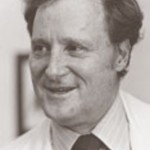 Title: Molecular Factors Affecting Persistence of DNA Damage: Consequences to Human Populations.
Title: Molecular Factors Affecting Persistence of DNA Damage: Consequences to Human Populations.
Biographical Sketch: Lawrence Grossman is the University Distinguished Service Professor of Biochemistry of the Johns Hopkins University School of Hygiene and Public Health in Baltimore.
He received a B.S. degree in Chemistry from Hofstra University in 1949, a Ph.D. in Biochemistry from the University of Southern California in 1954 and went on a post-doctoral fellowship at the John Hopkins University. He assisted in the development of the Biochemistry Department at Brandeis University in 1957 and rose to the rank of Professor before assuming the E.V. McCollum Chair at the John Hopkins University in 1975.
Professor Grossman has focused his early research efforts on the chemical basis of chemical and UV based mutagenesis in bacteria and bacterial viruses. He established the first in vitro replicating, transcribing and translational systems for studying the effects of DNA damage in information transfer. These studies were extended in correlational attempts to quantitate the extent and nature of damage induced mutations. It was because of the loss of the damaged nucleotides from DNA that he switched his attention to studying those bacterial and eukaryotic enzymes participating in the surveillance and repair of damaged sites in genetic material.
Both single and multiprotein repair systems have been characterized whose genes have been cloned, their gene products amplified and the purified protein systems systematically characterized revealing intrinsically novel biochemical mechanisms. The insights gained as a result of a scientific commitment to DNA repair have been extended to examine the role of DNA repair in tumour progression. The first human population studies have clearly implicated DNA repair as a causal factor in skin cancer and has established the role of DNA repair during the aging process.
He has received the merit award from the National Institute of General Medical Sciences in 1989, the Ernest Stebbins Medal for Public Health Education and was an awardee of Burroughs Wellcome, the Guggenheim Foundation, and the Commonwealth Fund. He served in an advisory capacity to the American Cancer Society and the National Institutes of Health in Biochemistry. He represented the International Union of Biochemistry to the National Academy of Sciences. Brochure
